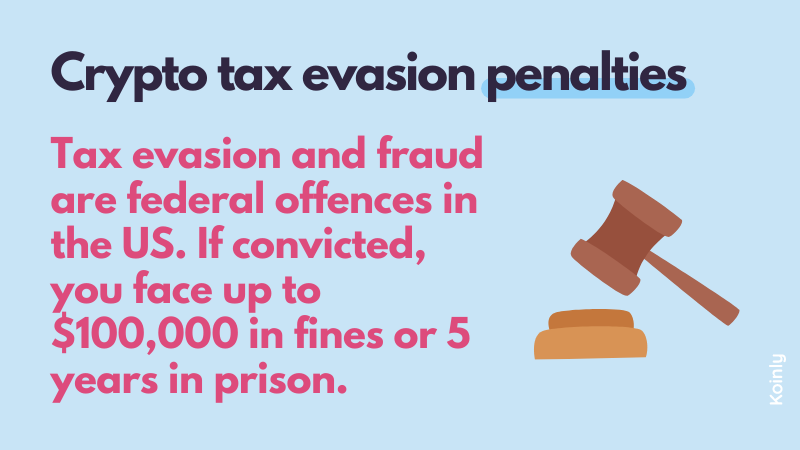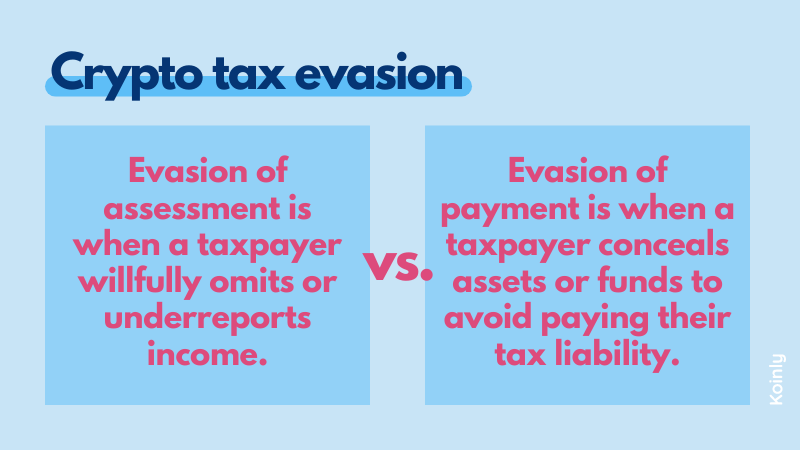What Happens if You Don't Report Cryptocurrency on Taxes in 2024?
What happens if you don't report cryptocurrency on taxes? Let's take a look at our crypto tax evasion guide, including how to file if you previously forgot to report crypto in your tax return.
What happens if I don't report cryptocurrency on my taxes?
The IRS is perfectly clear crypto is taxed and failure to report crypto on your taxes may result in steep penalties.
The punishments the IRS can levy against crypto tax evaders are steep as both tax evasion and tax fraud are federal offenses. Depending on the severity, you can face up to 75% of the tax due, with a maximum of $100,000 in fines ($500,000 for corporations) or up to 5 years in prison.
All this to say, if you’re thinking of risking it - don’t.
 You can learn more about how crypto is taxed in your country in our US Crypto Tax Guide.
You can learn more about how crypto is taxed in your country in our US Crypto Tax Guide.
Understanding cryptocurrency tax evasion
According to the IRS, there are two kinds of crypto tax evasion:
Evasion of assessment.
Evasion of payment.
The penalties for each type of crypto tax evasion differ.

Evasion of assessment
Evasion of assessment is the more common type of crypto tax evasion. This is when a taxpayer willfully omits or underreports income, or overstates deductions. Examples of crypto tax evasion include:
Not reporting capital gains from sales or other dispositions of crypto.
Under-reporting capital gains from sales or other dispositions of crypto.
Not reporting additional income received in cryptocurrency.
Not reporting business income received in cryptocurrency.
Not reporting wages paid in cryptocurrency.
Evasion of payment
Evasion of payment occurs after a tax assessment has been made and the taxpayer conceals assets or funds that could be used to pay off their tax liability. This kind of tax evasion is less common in the crypto space - though not unheard of entirely.
Wondering how to avoid crypto taxes?
Especially in the current bear market with the losses many investors are seeing, it can be very tempting to avoid crypto taxes from gains earlier on in the financial year. But you can't (and shouldn't) avoid crypto taxes.
Why?
Because the IRS can crack your crypto.
The IRS has a lot of avenues to find out about your crypto investments. Not only do many crypto exchanges already share KYC data with the IRS, but the IRS has also previously used John Doe summons to legally compel crypto exchanges to share user data. They've already won John Doe summons against Coinbase, Kraken, and Poloniex.
Not only this but your crypto investment information is shared with the IRS anytime you receive an IRS 1099 form. Many crypto exchanges like Coinbase, Crypto.com, and Kraken issue 1099 forms to certain US users - and whenever you get a 1099 form, the IRS does too.
Earlier in the year, the IRS announced they were adding 87,000 more agents and that crypto tax enforcement would be a key focus for the 2023 tax return. These agents will be trained in data-matching blockchain transactions with "anonymous" wallets. As blockchains are public ledgers, the IRS already has access to all the transactions made on a given blockchain. All they need to do is match your wallet address to you - and these agents will be doing precisely that.
We're already seeing the beginnings of this increase in crypto tax enforcement, as the IRS Criminal Investigation Division Chief, Jim Lee, confirmed in November 2022 that the IRS is building "hundreds" of cases relating to crypto tax evasion that will be announced publicly soon.
Want to learn how to avoid taxes on crypto - legally? See our how to avoid crypto tax guide.
How to submit an amended crypto tax return
Forgot to report cryptocurrency on taxes? Mistakes happen, so don't panic if you've previously avoided crypto taxes as you weren't aware of your tax obligations. Here's what you can do:
Figure out what you owe in crypto tax (this is much easier with a crypto tax tool like Koinly)
If possible, amend your return using IRS Form 1040X.
Return your form to the IRS. In general, you'll hear back from the IRS in between 8 to 12 weeks.
Alternatively, the IRS just updated Form 14457 - the Voluntary Disclosure Practice Preclearance Request and Application - to include a section on reporting virtual currency. Form 14457 lets taxpayers who may be facing criminal prosecution for violation of tax laws voluntarily disclose information to the IRS that they previously failed to disclose.
A voluntary disclosure can help you avoid criminal proceedings if you have previously evaded assessment or payment - provided the IRS hasn't initiated proceedings already. When you make a voluntary disclosure, you agree to cooperate with the IRS and pay any due taxes in full in order to avoid criminal proceedings. As you can see from the penalty above, it’s a much better option than a potential $100,000 fine or prison!
Can I file my tax amendment with TurboTax?
Yes. To file your amended return through TurboTax, open your last filed return in TurboTax and you'll see a link to amend your return.
How Koinly can help you file your crypto tax fast
Filing crypto taxes with Koinly is easy. Here's how it works:
Sign up for a free account. Sync all the wallets, exchanges, and blockchains you use with Koinly via API or by uploading a CSV file.
Koinly calculates your capital gains, losses, income, expenses, and more using your preferred cost basis method.
View your free tax summary on Koinly. You only pay when you want to download your report.
Download the report you need when you need it. For crypto gains, Koinly generates a pre-filled Form 8949 and Schedule D, or the Complete Tax Report for crypto income.
Prefer to file using a self-filing service? Koinly also generates TurboTax and TaxAct reports ready to upload to your tax filing service.
Use an accountant? Share access to your Koinly account with your accountant via settings.
TLDR;
Crypto tax evasion and crypto tax avoidance are illegal.
The IRS likely already knows about your crypto investments.
There are two kinds of tax evasion - evasion of assessment and evasion of payment.
Evasion of assessment is willfully omitting or underreporting income.
Evasion of payment is concealing funds or assets that could be used to pay a tax liability.
The penalty for tax evasion is up to $100,000 in fines or 5 years in prison.
You can use Form 14457 to declare taxes you've previously avoided on crypto.
Crypto tax evasion is a key focus for the IRS in 2022.




